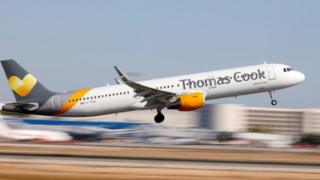Thomas Cook reassures holidaymakers after shares plunge
 Image copyright Reuters
Image copyright Reuters Troubled travel firm Thomas Cook has been reassuring customers who contacted the firm with concerns about holiday trips, after its share price crashed.
Its share price fell sharply at the end of last week, and it dropped a further 14% on Monday to just 10p.
Thomas Cook has been reassuring people on social media, and in a statement at the weekend, telling customers that it is “business as usual”.
The firm also said it was looking to strengthen its financial position.
On Sunday, Thomas Cook said: “We have the support of our lending banks and major shareholders, and just this week we agreed additional funding for our coming winter cash low period.
“We have ample resources to operate our business and at the same time, as usual, our liquidity position continues to strengthen into the summer period.”
Thomas Cook also said: “We’re responsible for taking over 20 million people abroad on holiday every year and we take that responsibility very seriously. As an ATOL-protected business, our customers can have complete confidence in booking their holiday with us.”
What is ATOL protection?
By Kevin Peachey, BBC personal finance reporter
Protection under the ATOL – or Air Travel Organiser’s Licence – scheme means UK travellers on an air package holiday do not lose their money or become stranded abroad if a holiday firm collapses.
It also covers many charter flights and means that, if the operator collapses while people are away, they can finish their holiday and be flown home at no extra cost.
If the business collapses before they go away, the scheme will provide a replacement holiday of equal value, or a refund.
When flights are booked on their own, or when people book flights and accommodation separately, the ATOL scheme does not usually come into effect. However, the ATOL scheme does now cover more custom-built holidays than it used to.
If a holiday is ATOL-protected it will be clearly marked with a certificate on holiday documents. The scheme is run by the UK Civil Aviation Authority and is backed by the UK government.
Thomas Cook released its statement after concerned customers asked the firm on social media if it was “about to go under” or “going into administration”.
Others had queried if the firm was “in danger of collapsing”, and if their holiday flights and packages were safe.
But on Twitter, Thomas Cook said: “We have been taking customers on their holidays with us for 175 years and we plan to do so for a very long time.”
It also said: “We are very much trading as normal and we aren’t going into administration”.
On Friday, analysts at Citigroup said the travel firm’s shares were “worthless”.
The bank’s damning conclusion came a day after Thomas Cook issued its third profit warning in less than a year and reported a £1.5bn half-year loss.
Citigroup analysts also pointed to a warning from auditor EY in Thomas’ Cook’s results which warned of “material uncertainties” over the group’s sale of its airline, on which a new £300m bank facility depends.
Thomas Cook is in the process of seeking bidders for its fleet of 105 jets as it tries to raise funds for the business. It says it has received “multiple bids” for the fleet.
The company is also seeking to cut costs. It has closed 21 of its High Street stores, its currency arm Thomas Cook Money is under review and more “cost efficiencies” are planned.
It has blamed a series of problems for its profit warnings, including political unrest in holiday destinations such as Turkey, last summer’s prolonged heatwave and customers delaying booking holidays due to Brexit. But it has also suffered from competition from online travel agents and low-cost airlines.



